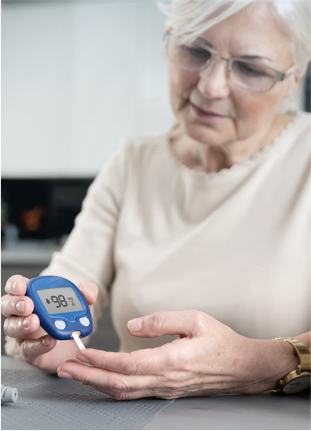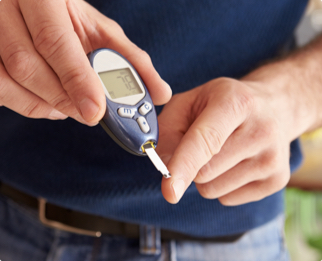Diabetic Foot Wound Care

Your Diabetic Foot Wound Care Specialist In Beverly Hills
Every year, millions of people are diagnosed with diabetes. Over 40% of the adult population has either diabetes or prediabetes. Many of these adults are at risk for major podiatric complications. If you have diabetes, it’s imperative that you care for your feet with the utmost caution. And we can help.
BookAn AppointmentOur Approach to Diabetic Foot Wound Care

“Diabetic wounds” refers to a multitude of injuries, including cuts, blisters, bruises, bumps, burns, and calluses. Anything out of the ordinary can potentially lead to a serious medical complication when you have diabetes.
We divide diabetic wounds into two general categories: internal origin and external origin. Internally originating wounds include anything produced by the body. This may refer to blisters, calluses, corns, and more. External wounds are injuries that happen outside the body, and may include cuts, scrapes, and lacerations.
Regardless of origin, all diabetic wounds put you at risk for complications, especially ulcers. Ulcers may fill with fluid that later gets infected. Any infection can lead to severe podiatric issues.
Our primary goal is a fast recovery to lower chances of infection.
This involves taking pressure off the area, applying medications, and using dressing to keep it unexposed. In severe cases, we may perform a debridement procedure, where dead skin and tissue are surgically removed.
Living With Diabetes
As someone with diabetes, you may be well aware of the signs of complications. In addition to treating and reducing your diabetes, attention should be given to your diabetic complications. You know to always monitor your blood sugar, but are you monitoring your feet? Any of the following may be signs of trouble, and should be assessed at our office: slow sore healing, tingling, burning, blisters, corns, calluses, ingrown toenails, thick toenails, and cold feet.
Because of your diabetes, blood flow reduction and nerve damage may have already occurred. An elevated blood glucose level also reduces the body’s ability to fight off potential infections. Diligent foot care is essential because injuries are harder to notice and slower to heal.
Amputation may be necessary.
Diabetes is the leading cause of non-traumatic lower extremity amputation in the United States, and approximately 20% of diabetic patients that have foot ulcers will require amputation. Because of nerve damage, most patients do not report pain as their first symptom. Instead, you may first notice drainage in your sock. Visible redness and swelling are often common. If the ulceration has progressed significantly, it may have an unpleasant odor.


Why Choose Dr. Nik?
Dr. Nik’s team has helped many patients mediate their diabetic complications and develop a plan for preventing future ulcers. We’re experts on everything from a minor wound to surgical procedures for deep pressure ulcers. In our years of experience, we’ve completed treatments that included surgical, chemical, mechanical, and autolytic debridement. If you’re experiencing diabetic complications, Dr. Nik’s is the place to go.
Meet Dr. NikOur Podiatry Services
Dr. Nik’s strives to deliver the finest, most cost effective podiatric health care available. If diabetes-related care isn’t quite what you need, don’t worry: we do more.
Peripheral Neruopathy Treatment
Peripheral neuropathy is often the result of diabetes, and manifests as damage in autonomic, sensory, and motor nerves.
Learn MoreStart Living Better Today!
Do you have any questions about Dr. Nik or our general services? We are always here and ready to help. Get in touch today.
